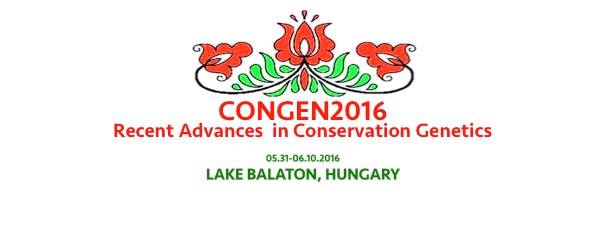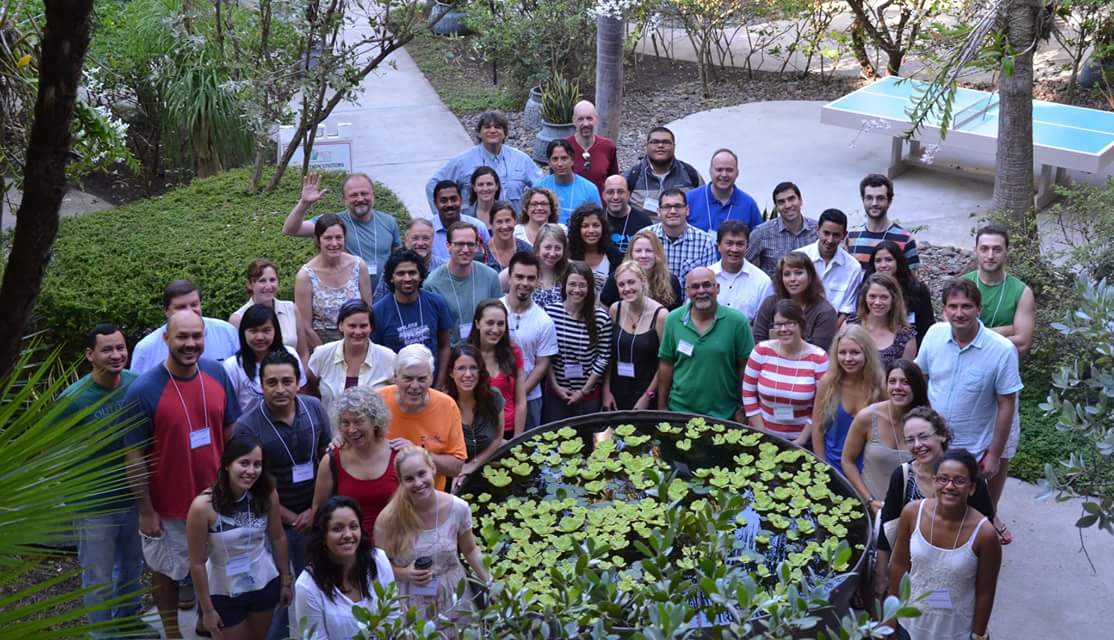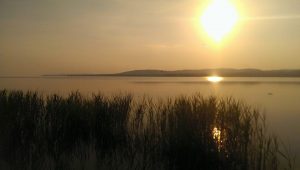Data Driven Conservation. Q&A with Taras Oleksyk on ConGen2016
The use of “big data” genomics technologies may gather most attention and funding in “big money” settings such as healthcare and agriculture, but due to a precipitous drop in cost its use has become increasingly ubiquitous in all corners of biological research, including biodiversity research and conservation. A lot of the front-line researchers in this area have been trained through the Recent Advances in Conservation Genetics (ConGen) workshops, now in their 20th year. The 2016 edition will be held at the Balaton Limnological Institute of the Hungarian Academy of Sciences near Budapest, over May 30-June 10, 2016. Hosting 25-30 students dedicated to conservation and about 20-25 faculty from around the world. This year ConGen2016 will celebrate two decades of this very successful course and look forward to an exciting new version that will be held in Europe for the first time.
The 2016 course will be organized in collaboration with Balaton Limnological Institute on the shores of a beautiful lake in the Transdanubian region of Hungary. The course will be directed by Dr. Stephen J. O’Brien (a supportive member of our fantastic Editorial Board), and taught by renowned scientists in methods, interpretation, and applications of molecular genetic analyses for conservation of endangered species, who will also share a variety of their personal experiences in this important field.
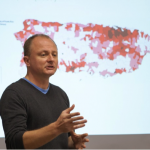 ConGen2016 faculty are an amazing group of people who come from all around the world and will be teaching, sharing their conservation stories and interacting with students during the course. GigaScience are supporting their efforts this year by sponsoring some of the student scholarships, and we decided to do a GigaBlog Q&A with deputy course director Taras Oleksyk, to find out more about the ConGen approach of teaching the next generation of scientific technologies to next generation of conservationists.
ConGen2016 faculty are an amazing group of people who come from all around the world and will be teaching, sharing their conservation stories and interacting with students during the course. GigaScience are supporting their efforts this year by sponsoring some of the student scholarships, and we decided to do a GigaBlog Q&A with deputy course director Taras Oleksyk, to find out more about the ConGen approach of teaching the next generation of scientific technologies to next generation of conservationists.
ConGen teaches the most recent advances in conservation genetics to scientists studying endangered species. How do envision what they learn will be used in front line conservation?
ConGen is a course in methods, interpretation, and applications of molecular genetic analyses for conservation of endangered species, who will also share a variety of their personal experiences in this important field. As our founder Dr. Stephen J. O’Brien likes to say, it brings in two types of scientists: those in the field that do not have much experience working in the laboratory need to understand genetic data, and those who mostly work in laboratory or to develop and interpret the results. Our short course brings people together and makes them interact. This is the real value of the course – the amalgamation of different knowledge that otherwise remained separated. In you are starting in the field, ConGen is a really great place to start your research network.
During the course, students are exposed to a wide variety of topics. Techniques and data types range from genotyping by SNPs and microsatellites, through DNA sequencing, and analysis of the whole genome data. Databases, metadata, and sample management were also presented in the conservation context. Sessions start early in the morning and go throughout the day: it is a very intense course that covers an entire semester in 10 days packed with lectures, hands-on computer exercises, field trips and laboratory training. The diversity of topics covered is unparalleled, and the commitment and the dedication of our outstanding international faculty makes it one the most affordable and comprehensive conservation genetics schools in the world.
Its amazing this is the 20th year of the workshop, so have there been any interesting outcomes from it, and what has its legacy been to date?
ConGen started in the USA, but in the 20 years of its history, we have hosted ConGen workshops all over the world, from Brazil to Panama, from Hawaii to South Africa, from Puerto Rico to, now – Hungary. This geographic factor has a lot of advantages, even though it brings a lot of logistical hustles. Each one of these locations represents a different set of conservation issues, so both students and the faculty gets exposed to different problems, which help them explore their own research in a context of state-of the-art approaches ”. In addition, each time the course travels to another location, it engages and educates local conservation community.
For instance, in 2015, ConGen Puerto Rico attracted faculty and students from 18 different countries, many from Central and South America, but also from Asia, Africa, Europe and the US. We invited a number of local faculty from the University of Puerto Rico to present several case histories, particularly the research on coral reefs and the conservation of Puerto Rican parrot. Finally, every night, one of our speakers would present an open lecture series opened to the public. It attracted hundreds of local people every night, and in several lectures we ran out of chairs. It was a great statement to how important our field is, and how the general public perceives it.
It was really great for the aspiring conservation scientists to see successful examples from the field. Many students have told me that they were inspired by the course, and would continue working in this challenging, but rewarding field.
GigaScience are contributing to your tuition scholarship scheme this year, so what is the make up of the students that normally attend the event?
There is an intensive selection procedure and the admission committee looks at every application carefully. The pool of applicants is very diverse: senior graduate students, postdoctoral fellows, young faculty, and conservation professionals both from universities, governmental agencies, private foundations and NGOs. We attempt to attract the most able and promising candidates. We also try to help those who come from the places where funding sources are scarce, but conservation issues are urgent. Thanks to the continuous support of the American Genetic Association, we have been able to provide such support for a number of students. Usually, we give tuition scholarships including meals and lodging – the course is all-inclusive. For many of our students it is the first real opportunity to travel abroad and network with the like-minded colleagues from around the world.
Lately, we received donations from the private companies that allow ConGen to admit more candidates. For instance, ConGen Puerto Rico was supported by the local Bioanalytical Instruments company, University of Puerto Rico at Mayaguez, and Geneious (New Zealand). ConGen 2016 received support from the Hungarian Academy of Sciences, Cape Air (USA) and from GigaScience. Finally, Dobzhansky Center for Genome Bioinformatics at St. Petersburg State University (Russia) contributes travel for several faculty and especially the computational staff that are critically needed for the success of the latest editions of ConGen.
Finally, many of the ConGen faculty and alumni has made personal contributions, paying for their own travel, supporting students to attend. Students, also searched and found personal sponsors, or often saved up to be able to come. We are a very dedicated group, but I guess it does reflect the field we are in – in order to achieve anything in it, you have to be able to make sacrifices.
How are the latest advances in genomic technologies helping this field, and will you be covering them in the course?
We are always trying to bring the latest in genome technology to the conservation community. Several of the ConGen faculty developed research programs that started with the genome sequencing of their model organisms. The latest example of these was the cheetah genome paper recently published in Genome Biology that just has been highlighted in the New York Times. To date nearly 300 species of vertebrates, the majority listed as endangered or threatened, have been the object of whole genome sequence assessment, analyses, and applications. Genomics is making a real difference in conservation management today, and ConGen prepares the future conservationist for the important challenges they will surely face.
In addition to the bioinformatics exercises that deal with various types of data from the next generation of sequencing, we often include hands on lab exercises. For instance, in the past, we coopted local experts to training participants in tissue sampling, blood work, artificial insemination, sperm and egg evaluation and banking. In addition, we had training in DNA extraction. Now we are working on getting some hands on next generation training, as the technology gets cheaper and more portable, there are people that are looking forward to take in to the field.
Can you give us a little taster of some of the speakers and topics that will be covered in the 10-days?
ConGen 2016 faculty is an amazing group of over 25 experts who come from all around the world and will be teaching, sharing their conservation stories and interacting with students during the course. In the regular hours of the course, these experienced leaders survey data mining from different genotyping and next-generation sequencing platforms and databases, sequence alignment, trait mapping and molecular dating, parentage, population genetics analyses using genetic markers, microsatellites, or DNA sequence data, haplotype inference, detecting and measuring selection, basic and advanced phylogenetics, comparative genomic analyses, host specificity and disease adaptation. The schedule is packed with lectures, workshops and computer exercises starting at 8:30 AM every day and continuing through evening lectures and late-night computer sessions The agenda is coordinated by Klaus-Peter Koepfli from the Smithsonian Institution, Eduardo Eizirik for University of Puerto Allegre in Brazil, our local host Viktor Tóth of the Balaton Limnological Institute, and myself in an attempt to develop a coherent and informative experience.
In addition, there are a lot of personal stories that are shared, both during the regular time of the workshop, as well as during the Open Science Lecture series. Our founder and Director, Stephen J. O’Brien usually gives the overview of the field on the first day of the workshop. Scott Baker (Oregon State) tells his famous story about natural history and forensic genetics of whale conservation, a story celebrated with an Oscar Academy Award to “The Cove“ in 2010. Oliver Rider (San Diego Zoo) talks about the efforts to preserve genetic diversity in the Frozen Zoo, and the possible de-extinction of species using the recent technologies. Emma Teeling (University College Dublin will present a highly motivational talk on how bat genomes hold a key to the long life. Both Emma and Oliver have given highly prestigious TEDx talks. There are other exciting stories to be presented at Balaton: Cindy Harper (University of Pretoria) on the role of forensic individualization of poached rhinoceros in South Africa; Bridget von Holdt (Princeton University) on the genetics and conservation of the American wolves, Alfred Roca on the African forest and savannah elephants. The list is very extensive, but it is all already on our website congen2016.com.
With misunderstanding and fear of DNA-technologies by much of the public, is ConGen doing any outreach to let the wider public know about the importance of genetics and genomics research for conservation?
The ConGen Open Science Lecture Series is designed to do just that. Scientists should learn to communicate, without the support of the local communities, a lot of conservation work is not possible. I think that ConGen provides a platform for us, faculty to learn how to communicate not only with students, but with the general public.
In Puerto Rico, we had hundreds of people come from all over the island to see these talks. It may offer a special challenge in Hungary where English is not as widely used, but this is a one we are ready to face. Let me tell you a personal story I witnessed at ConGen2015. Before her public talk, Emma Teeling told me about a Puerto Rican schoolgirl who wrote her a letter about how much she wanted to study bats. She sent a picture of herself holding a bat. Emma was very excited, and wrote back to encourage the young woman to study her favourite animal. She was not sure if she could come all the way to the Western side of the island, it would take her no less than three hours to drive here one way. But the girl came to Emma’s talk anyway – she convinced her mother to drive here there and back in a single day. It was a very moving moment when two of them met. I think that was a good day for the future of conservation biology, and I don’t think either of them would forget that meeting. And this is just it, sometimes we need to win the hearts of people, one heart at the time.
You published the genome of the critically endangered Puerto Rican parrot with us in 2012 (see our blog on the crowdfunding of the “the peoples parrot”), so has being one of the first bird genomes sequenced and made public aided in the subsequent conservation efforts? Any updates to share on the project?
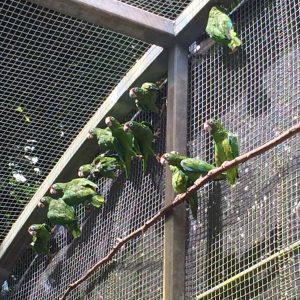 The parrot project has been is a constant development. We teamed up with the US FWS and Princeton University to publish a set of microsatellite markers that should be useful to identify individuals in pedigrees. A paper on mitochondrial DNA map is now ready to submission, and it will be followed by the papers with genomes of five other Caribbean Amazons. Population genetics studies are being planned with the DNER and US FWS, and thanks to the collaboration with the bioinformatics group at the Theodosius Dobzhansky Canter there are a lot of possibilities in training and teaching, and student exchange using the parrot genome research as a model. There are a lot of interesting things to come; it is all just a beginning.
The parrot project has been is a constant development. We teamed up with the US FWS and Princeton University to publish a set of microsatellite markers that should be useful to identify individuals in pedigrees. A paper on mitochondrial DNA map is now ready to submission, and it will be followed by the papers with genomes of five other Caribbean Amazons. Population genetics studies are being planned with the DNER and US FWS, and thanks to the collaboration with the bioinformatics group at the Theodosius Dobzhansky Canter there are a lot of possibilities in training and teaching, and student exchange using the parrot genome research as a model. There are a lot of interesting things to come; it is all just a beginning.
There is still time to register for the course, follow them on facebook, and see the ConGen2016 homepage for more details: http://congen2016.com/.